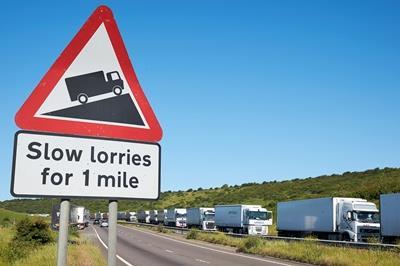
Transport organisations have welcomed news of a relaxation in enforcement of the driver’s hours rules today in light of recent problems for cross-Channel freight vehicles, but have been split in their reactions to the detail of the change.
Earlier today, the DfT said it had agreed an immediate relaxation of enforcement of EU drivers’ hours rules for cross-Channel commercial vehicle traffic in Europe and UK vehicle operators based in Kent whose journeys were affected by recent disruption.
The temporary relaxation of enforcement - initiated in response to current industrial action at the port of Calais and migrant incidents at the Eurotunnel terminal and the Channel Tunnel – came into force immediately and will run for a period of 30 days at the times when Operation Stack is in place.
It applies only to drivers whose journeys are delayed due to the industrial action or disruption in Calais, and who have used a ferry or Eurotunnel to reach or leave Kent; are waiting in Kent to leave the UK; or are driving a commercial vehicle operated from an operating centre in Kent.
Under the relaxation, the EU daily driving limit of nine hours is replaced with a daily driving limit of 11 hours; while the daily rest requirements have been cut from 11 to nine hours.
The requirement for a 45 minute break after four and a half hours’ driving remains, as do all elements of the working time rules, stressed the DfT.
The DfT stated that the relaxation in enforcement would remain “under constant review” and could be withdrawn or suspended with less than 24 hours’ notice. It also said that as a general rule it expected businesses “to plan for and manage the risks of disruption to supply chains”.
While the FTA said the relaxation made “perfect sense” and described it as a “proportionate response”, however, the RHA said it had gone “too far”.
It said the extension of the driving day on its own was welcome but that curtailment of the daily rest period was “ill-judged and likely to lead to the exploitation of hauliers and their drivers and a reduction in road safety”.
Calling for confirmation that the relaxation would be respected by enforcement officers right across Europe, the RHA also questioned the enforceability of the provisions regarding vehicles in Kent and said it was “astonished” by the DfT’s statement about expecting business to plan for supply chain disruption.
The DfT has not so far responded to a request for comment on the RHA’s concerns.
Meanwhile, news that 120 new French police officers were being sent to secure the Eurotunnel terminal in Coquelles has also received a mixed reaction.
A Eurotunnel spokesman told Motortransport.co.uk that anything the authorities could add to maintain law and order in the area was welcome. “But the reality is that there are 5000 or more migrants in the Calais area and they are continuing to come,” he added.
Some humanitarian groups suggest around 100 new migrants a day are arriving in Calais and the real issue was not securing the appropriate areas in northern France but stemming the flow of migrants in the first place, he added. “Any attempts to solve this crisis in Calais are doomed to failure. The only way to solve it is to stop the flow arriving and remove those that are actually here,” he confirmed.
Eurotunnel alone has thwarted 37,000 illegal attempts to cross the Channel so far this year and spent €13m on physical and human resources to help deal with the migrant problem.
A spokeswoman for the RHA – which has been calling for several weeks for deployment of the French army to maintain order in northern France – also said the 120 new officers were not going to make much difference.
“We’re hearing of thousands of migrants descending on the secure area every night,” she stressed. “120 more police isn’t going to scratch the surface on that.”
Neither, she suggested, would the £7m of fresh money being made available by the UK for new fencing at the Eurotunnel terminal in Coquelles. “These migrants have travelled thousand of miles. A bit of fencing really isn’t going to act as a deterrent,” she commented.
“Bringing in the military would allow an end to be put to ‘Operation Stuck’ and allow the port to be secured so free flow of freight can be resumed. At the same time, the authorities would need to work on a long-term solution,” she said.











